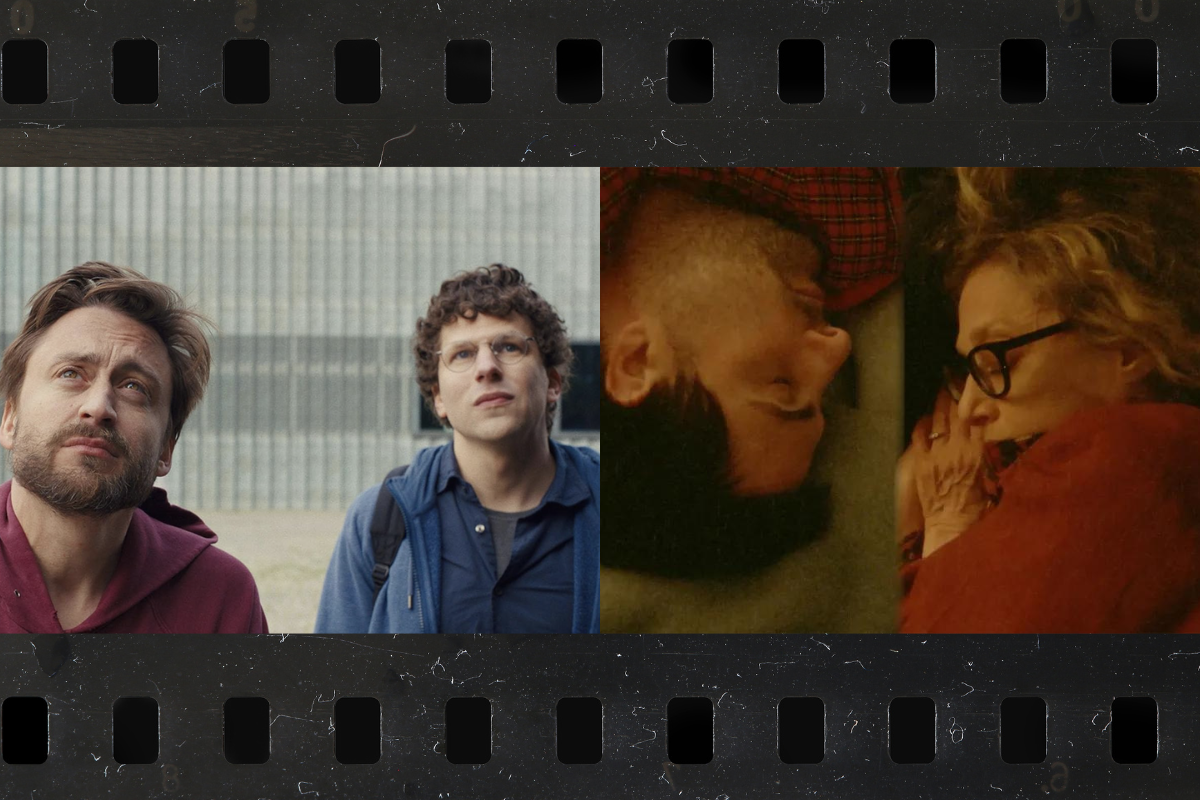Can Jews be happy? Should Jews be happy? My answers to these questions are “yes” and “depends on the occasion and the Jew,” respectively, but these lead to a third question that’s more complicated to address: How can Jews be happy? Such questions of Jewish happiness are at the center of two of the most acclaimed films of the 2024 Sundance Film Festival: “A Real Pain,” directed by Jesse Eisenberg, and “Between the Temples,” directed by Nathan Silver.
“A Real Pain” (which won the festival’s Waldo Salt Screenwriting Award) follows two cousins, David (Jesse Eisenberg) and Benji (Kieran Culkin), on a tour of Poland to see the former home of their recently deceased Holocaust survivor grandmother. Upon first impressions, Benji seems to know how to enjoy himself more than David does; he’s funny, forms connections with people instantly, and tries to get his neurotic cousin to relax and lighten up. And yet Benji’s moods can easily swing in the opposite direction – if David’s perpetual discomfort stays bubbling under at a functional level, Benji’s sadness threatens to become too much to bear.
One fascinatingly revealing scene takes place while the tour group is on a train. When Benji points out the irony of a bunch of Jews taking a train in Poland, what starts off sounding like an off-color joke turns into fuel for a full-on existential crisis. How dare we enjoy these first class luxuries, Benji questions, when we’re here learning about a genocide? Eventually he swings back around to being okay with sitting in first class – “they owe us,” he reasons – but his drastic emotional reactions dramatize the complexity of responding to a history of suffering. Benji fears he’s been squandering the privileges he was born into – privileges his grandparents did not have when they came from Poland to America with nothing. The extent to which this fear weighs on him proves heartbreaking.
Where “A Real Pain” presents issues of Jewish generational trauma with a lighter touch, accompanied with Chopin music and perfectly composed travelog imagery, “Between the Temples” is a more overwhelming viewing experience, closer to the gritty style of the Safdie brothers (sure enough, it shares a cinematographer, Sean Price Williams, with several Safdie films). The main character, Ben Gottlieb (Jason Schwartzman), is a cantor who can’t sing anymore following the death of his wife. His biological mother Meira (Caroline Aaron) tells him his depression runs in the family; his other mother Judith (Dolly de Leon), a Filipino convert fully embracing the stereotypical role of “Jewish mother,” is evidence that anxiety runs in the culture.
The one bright spot in Ben’s life at the moment is Carla (Carol Kane), his former music teacher who now comes to him seeking lessons for an adult bat mitzvah. Based on how the relationship between the older enthusiastic student and younger depressed teacher develops, a lot of people have described “Between the Temples” as being “the Jewish ‘Harold and Maude.’” It’s an accurate descriptor, but a semi-redundant one – Maude was already a Jewish Holocaust survivor, making “Harold and Maude” its own fascinating reflection on happiness in the aftermath of Jewish pain.
In both “A Real Pain” and “Between the Temples,” sources of happiness can be found within Jewish tradition, in spite of all that’s depressing or maddening about being Jewish. One of “A Real Pain”’s most interesting supporting characters, Eloge (Kurt Egyiawan), is a survivor of the Rwandan genocide who found solace in joining the Jewish community and places particular value on observing Shabbat – a practice he thinks would be particularly helpful for David. In “Between the Temples,” Carla’s bat mitzvah might not be what she expects, but it nevertheless ends up being a powerful experience.
Said bat mitzvah is also an act of letting someone know that they’re appreciated – something everyone needs when facing the pain of the world. Such positive affirmations are in relatively low supply in “Between the Temples,” which climaxes in one of the most uncomfortable dinner scenes ever filmed, which makes those small moments of kindness stand out all the more. The cousins in “A Real Pain” may drive each other crazy, but what really drives them crazy is that they recognize in each other the qualities they lack in themselves. When their failures to recognize their own strengths bring them to dark places, they need one another’s support to be able to see their own value.
Both films come at the question of how Jews can be happy through a different storyline, but in the end, they arrive at similar conclusions: connection and community are mixed blessings, but they can help us find happiness in moments where it seems unreachable — when they’re not actively making things more difficult, at least.
“A Real Pain” will be released in theaters later this year by Searchlight. Release plans have yet to be announced for “Between the Temples.”



